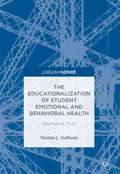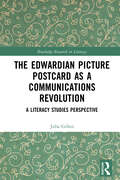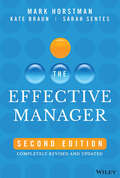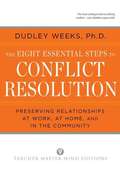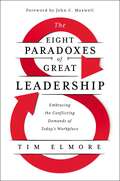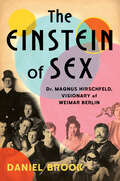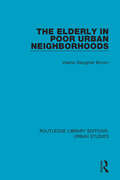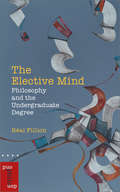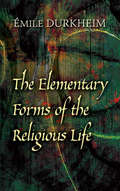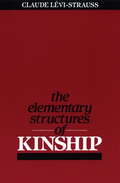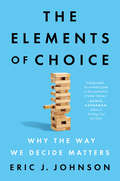- Table View
- List View
The Educational Thought and Influence of Matthew Arnold (International Library of Sociology #Vol. 12)
by W.F. ConnellDrawing on the great wealth of knowledge and experience of education practitioners and theorists, these volumes explore the very important relationship between education and society. These book became standard texts for actual and intending teachers. Drawing upon comparative material from Israel France, and Germany, titles in The Sociology of Education set of the Internation Library of Sociology also discuss the key questions of girls' and special needs education, and the psychology of education.
The Educationalization of Student Emotional and Behavioral Health: Alternative Truth
by Teresa L. SullivanThis book examines the current political, social, and economic positions that push the responsibility for the emotional health of students onto schools. The context of recent education reform asks schools to mitigate adverse emotional health of students by developing and implementing broad programming, curriculum, and policies immersed in cognitive behavioral approaches. The design plan is intended to build resilience and develop strategies in students that will enable them to succeed despite adverse structural conditions. The swindle of education reform is that it deflects and blames families, youth, and the school system for the social ills of society. From the perspective of a thirty year Massachusetts educator and high school principal emerges an alternative reality that not only challenges decades of education reform entrenched in victim blaming but also exposes a serious responsibility gap.
The Educator and The Ordinary: A Philosophical Approach to Initial Teacher Education
by Elizabeth O'BrienThis book creates a unique discursive environment to consider how initial teacher education can support student teachers in practical and personal senses, in what they can do and who they are. What is it to care? To develop our voice? To educate in beautifully risky ways? Engaging with the philosophy of Stanley Cavell, Gert Biesta and Nel Noddings, central capabilities of the educator are suggested: Acknowledgement, Autobiography, Imagination, Interruption, Attention and Uncertainty, culminating in the essential, unifying capability of The Ordinary, underpinned by Complexity and Hope.This book will appeal to those interested and engaged in initial teacher education, professional development and support from early years to higher education and practicing educators. It aims to enrich theoretical as well as practical discussion, to influence how we live, how we think, and how we treat each other.
The Edupreneur's Side Hustle Handbook: 10 Successful Educators Share Their Top Tips
by Lisa Dunnigan Tosha WrightFind out how you can use your talents as an educator to make extra money on the side! In this helpful book, top Instagram influencers share how they’ve had success with selling lesson plans, handouts, t-shirts, and more, while maintaining careers as teachers and school leaders. You’ll hear from these inspiring educators: Lisa Dunnigan and Tosha Wright @thewrightstuffchics Jen Jones @hellojenjones Michelle Ferré @pocketfulofprimary Kisha Mitchell @sweetteaandsunshinepodcast Bryce Sizemore @theteachingtexan Kristen Donegan @easyteachingtools Cynthia Frias @followsocialone Kayse Morris @kaysemorris Eric Crouch @adventureswithmrc If you’ve always dreamed of having a side hustle but weren’t sure you had the time or the know-how, this is the book for you. Each chapter offers tons of practical tips to help you get started, along with humorous anecdotes and words of wisdom to keep you motivated on your journey.
The Edwardian Detective: 1901-15 (Routledge Revivals)
by Professor Joseph KestnerThis title was first published in 1999 & examines the range of detective literature produced between 1901 and 1915 in Britain, during the reign of Edward VII and the early reign of George V. The book assesses the literature as cultural history, with a focus on issues such as legal reform, marital reform, surveillance, Germanophobia, masculinity/femininity, the "best-seller", the arms race, international diplomacy and the concept of "popular" literature. The work also addresses specific issues related to the relationship of law to literature, such as: the law in literature; the law as literature, the role of literature in surveillance and policing; the interpretation of legal issues by literature; the degree to which literature describes and interprets law; the description of legal processes in detective literature; and the connections between detective literature and cultural practices and transitions.
The Edwardian Picture Postcard as a Communications Revolution: A Literacy Studies Perspective (Routledge Research in Literacy)
by Julia GillenThis monograph offers a novel investigation of the Edwardian picture postcard as an innovative form of multimodal communication, revealing much about the creativity, concerns and lives of those who used postcards as an almost instantaneous form of communication. In the early twentieth century, the picture postcard was a revolutionary way of combining short messages with an image, making use of technologies in a way impossible in the decades since, until the advent of the digital revolution. This book offers original insights into the historical and social context in which the Edwardian picture postcard emerged and became a craze. It also expands the field of Literacy Studies by illustrating the combined use of posthuman, multimodal, historic and linguistic methodologies to conduct an in-depth analysis of the communicative, sociolinguistic and relational functions of the postcard. Particular attention is paid to how study of the picture postcard can reveal details of the lives and literacy practices of often overlooked sectors of the population, such as working-class women. The Edwardian era in the United Kingdom was one of extreme inequalities and rapid social change, and picture postcards embodied the dynamism of the times. Grounded in an analysis of a unique, open access, digitized collection of 3,000 picture postcards, this monograph will be of interest to researchers and postgraduate students in the fields of Literacy Studies, sociolinguistics, history of communications and UK social history.
The Effective Change Manager's Handbook
by David King Richard Smith Apmg Dan Skelsey Ranjit SidhuThe change management profession is no longer in its infancy. Readily identifiable in organizations and in business literature it is no longer reliant on parent disciplines such as organizational development or project management. Change management is itself in a state of change and growth - the number of jobs is increasing and organizations are actively seeking to build their change management capability. The Effective Change Manager's Handbook, the official guide to the CMI Body of Knowledge, is explicitly designed to help practitioners, employers and academics define and practice change management successfully and to develop change management maturity within their organization. A single-volume learning resource covering the range of underpinning knowledge required, it includes chapters from esteemed and established thought leaders on topics ranging from benefits management, stakeholder strategy, facilitation, change readiness, project management and education and learning support. Covering the whole process from planning to implementation, it offers practical tools, techniques and models to effectively support any change initiative.
The Effective Manager
by Mark Horstman Kate Braun Sarah SentesAn essential resource for managers at every level of any organization A management book written by managers for front-line managers, The Effective Manager, 2nd edition, is a concise, practical, and incisive take on what to do and say to get the best results possible from your co-located or remotely distributed team. The book's concrete advice will improve your relationships with your team members, increase your chances of being promoted, and generate trust amongst those you lead. You'll learn why managing remote teams is so much harder than managing one in a single location and how to meet that challenge head-on. You'll also discover how to introduce your ideas to your team, counter their concerns and pushback, and ensure your instructions are followed. In the place of vague bromides about being "impactful" or "candid," you'll get hands-on guidance on how to behave in the situations that managers find themselves in on a daily basis. The authors also offer: Data- and evidence-driven advice that's been proven to work in the real world over the last 30 years Ground-level, real-world tips on getting the best work out of your team without burning them out Four critical manager behaviors that build success: Know your people, talk about performance, ask for more, and push work down A book for every manager at every level, The Effective Manager shows you what you can do now, today, with your team members to improve their performance, increase personnel retention, and get better results.
The Egg Bowl: Mississippi State vs. Ole Miss, Second Edition
by William G. BarnerFrom the contentious delay of the first clash in 1901 to the battle in 2009, The Egg Bowl covers the Ole Miss–Mississippi State rivalry in depth. For each game the narrative includes every scoring drive, every player who crossed the goal line, and every final score. More than 150 photos illustrate the intensity of action on the field and capture the players and exploits faithful fans will always remember. This updated edition features full accounts of the games in 2007, 2008, and 2009, including new photos and statistics. For the booster who demands to know every statistic, The Egg Bowl creates the ultimate reference. Which player has scored the most touchdowns? Who rushed for the longest run or threw the longest touchdown pass? How many kickoffs have been returned for touchdowns? Why is November 30 of consequence? Which two men have coached at both schools? And surprisingly, which three players have lettered at Mississippi State and Ole Miss? The intensity of the rivalry cannot be understated. Student leaders created the treasured Golden Egg, trophy of the yearly contest, to quell frequent fisticuffs in the stands. While intended to cool the fervor, the Egg has been controversially remodeled, refurbished, and even kidnapped. The story continually simmers. This ideal gift for the football fanatic will only stoke those passions.
The Egg Bowl: Mississippi State vs. Ole Miss, Third Edition
by William G. BarnerFrom the contentious delay of the first clash in 1901 to the latest battle in 2023, The Egg Bowl: Mississippi State vs. Ole Miss, Third Edition updates the two previous editions to give the most accurate, in-depth overview of the Ole Miss–Mississippi State rivalry. For each game the narrative includes every scoring drive, every player who crossed the goal line, and every final score. One hundred ninety photographs illustrate the intensity of action on the field and capture the players and exploits faithful fans will always remember. The passion of the rivalry between these two schools cannot be overstated. Student leaders created the treasured Golden Egg, the trophy of the yearly contest, to quell frequent fisticuffs in the stands. While intended to cool the fervor, the Egg has been controversially remodeled, refurbished, and even kidnapped. On and off the field, the rivalry continually simmers. This new third edition features full accounts of the games from 2010 to 2023, including new photos and statistics. For the fan who demands to know every stat, The Egg Bowl is the ultimate reference. Which player has scored the most touchdowns? Who rushed for the longest run or threw the longest touchdown pass? How many kickoffs have been returned for touchdowns? Why is November 30 of consequence? Which two men have coached at both schools? And surprisingly, which three players have lettered at Mississippi State and Ole Miss? This is the ideal reference for football fanatics and the perfect gift for both State and Ole Miss fans.
The Egyptian Military in Popular Culture
by Dalia Said MostafaThis book examines a key question through the lens of popular culture: Why did the Egyptian people opt to elect in June 2014 a new president (Abdel Fattah al-Sisi), who hails from the military establishment, after toppling a previous military dictator (Hosni Mubarak) with the breakout of the 25 January 2011 Revolution? In order to dissect this question, the author considers the complexity of the relationship between the Egyptian people and their national army, and how popular cultural products play a pivotal role in reinforcing or subverting this relationship. The author takes the reader on a 'journey' through crucial historical and political events in Egypt whilst focusing on multi-layered representations of the 'military figure' (the military leader, the heroic soldier, the freedom fighter, the conscript, the martyred soldier, and the Intelligence officer) in a wide range of popular works in literature, film, song, TV drama series, and graffiti art. Mostafa argues that the realm of popular culture in Egypt serves as the 'blood veins' which feed the nation's perception of its Armed Forces.
The Eight Essential Steps to Conflict Resolution: Preserving Relationships at Work, at Home, and in the Community
by Dudley WeeksProblems that "just won't go away" can be settled through methods developed by one of America's leading experts in conflict resolution. In clear language, Weeks shows readers how to turn conflict into lasting partnerships and ensure a fruitful outcome.
The Eight Paradoxes of Great Leadership: Embracing the Conflicting Demands of Today's Workplace
by Tim ElmoreBecome a next generation leader—rich in emotional and social intelligence and orchestrating outstanding collaborative results—by mastering these eight status quo-shattering paradoxes.The Eight Paradoxes of Great Leadership unpacks the fresh strategies and new mindset required today from a next generation leader. Author Dr. Tim Elmore helps leaders of all kinds navigate increasingly complex, rapidly changing environments, as well as manage teams who bring a range of new demands and expectations to the workplace that haven&’t been seen even one generation prior.After working alongside John C. Maxwell for twenty years, Tim offers counter-intuitive paradoxes that, when practiced, enable today&’s leader to differentiate themselves and better connect with their team and customers. The book furnishes ideas that equip leaders to inspire team members in a way a paycheck never could. Having trained hundreds of thousands of young professionals to develop into leaders—Dr. Elmore shares the secrets of next generation leaders who have practiced the unique paradoxes outlined in this book and inspired their team members in a way that a paycheck never could. In The Eight Paradoxes of Great Leadership, readers will: Learn how today&’s team members require a combination of different qualities from their leaders than they did in even the recent past;Grasp the importance of eight key paradoxes that are critical for next generation leaders to put into practice right now;Be inspired by historic and modern-day leaders who lived the eight paradoxes; andUnderstand how they too can lead with the eight paradoxes, guiding them to emotional and social intelligence that resonates with their teams and leads to outstanding collaborative results.
The Eighth Day: Social Evolution as the Self-Organization of Energy
by Richard Newbold AdamsCan human social evolution be described in terms common to other sciences, most specifically, as an energy process? The Eighth Day reflects a conviction that the human trajectory, for all its uniqueness and indeterminism, will never be satisfactorily understood until it is framed in dynamics that are common to all of nature. The problem in doing this, however, lies in ourselves. The major social theories have failed to treat human social evolution as a component of broader natural processes. The Eighth Day argues that the energy process provides a basis for explaining, comparing, and measuring complex social evolution. Using traditional ecological energy flow studies as background, society is conceived as a self-organization of energy. This perspective enables Adams to analyze society in term of the natural selection of self-organizing energy forms and the trigger processes basic to it. Domestication, civilization, socioeconomic development, and the regulation of contemporary industrial nation-states serve to illustrate the approach. A principal aim is to explore the limitation that energy process imposes on human social evolution as well as to clarify the alternatives that it allows. Richly informed by contemporary anthropological historicism, sociobiology, and Marxism, The Eighth Day avoids simple reductionism and denies facile ideological categorization. Adams builds on work in nonequilibrium thermodynamics and theoretical biology and brings three decades of his own work to an analysis of human society that demands an extreme materialism in which human thought and action find a central place.
The Einstein of Sex: Dr. Magnus Hirschfeld, Visionary of Weimar Berlin
by Daniel BrookAn illuminating portrait of a lost thinker, German-Jewish sexologist and activist Magnus Hirschfeld. More than a century ago, Dr. Magnus Hirschfeld, dubbed the “Einstein of Sex,” grew famous (and infamous) for his liberating theory of sexual relativity. Today, he’s been largely forgotten. Journalist Daniel Brook retraces Hirschfeld’s rollicking life and reinvigorates his legacy, recovering one of the great visionaries of the twentieth century. In an era when gay sex was a crime and gender roles rigid, Hirschfeld taught that each of us is their own unique mixture of masculinity and femininity. Through his public advocacy for gay rights and his private counseling of patients toward self-acceptance, he became the intellectual impresario of Berlin’s cabaret scene and helped turn his hometown into the world’s queer capital. But he also enraged the Nazis, who ransacked his Institute for Sexual Science and burned his books Driven from his homeland, Hirschfeld traveled to America, Asia, and the Middle East to research sexuality on a global scale. Through his harrowing lived experience of antisemitic persecution and a pivotal late-in-life interracial romance, he came to see that race, like gender, was a human invention. Hirschfeld spent his final years in exile trying to warn the world of the genocidal dangers of racism. Rich in passion and intellect, The Einstein of Sex at last brings together this unsung icon’s work on sexuality, gender, and race and recovers the visionary who first saw beyond the binaries. A century after his groundbreaking work—as the fights for personal freedom and societal acceptance rage on—Hirschfeld’s gift for thinking beyond the confines of his world has much to teach us
The Elderly in Poor Urban Neighborhoods (Routledge Library Editions: Urban Studies #6)
by Valerie Slaughter BrownFirst published in 1997. Considerable research has been done to identify neighbourhood influences on children’s affective states, motivation, and behaviour. This population, along with the elderly, are the nation’s largest dependent groups. In contrast, little research has been done to determine what impact living among poor neighbours has upon older Americans, specifically upon their psychological well-being and neighbourhood satisfaction. In this study the author has sought out to explore this deficit, using a sociological standpoint to examine quality-of-life issues relevant to elderly inner-city residents. This title will be of interest to students of sociology and urban studies.
The Elective Mind: Philosophy and the Undergraduate Degree (Philosophica)
by Réal FillionThis book discusses the relevance of philosophy courses within the undergraduate curriculum as integral to the self-formation that is at the heart of a liberal education. The objective is to provide a historically layered view of what it can still mean to study for its own sake. The elective university classroom is important because the course of study is chosen out of personal interest and enthusiasm, as opposed to being primarily governed by predetermined disciplinary objectives. It engages the student’s mind directly and freely, and counters the overly specialized minds favoured by the contemporary university as well as the commodification of its degrees. The discussion builds on the distinction put forward by Raymond Williams between a dominant culture (in this case, university study as contributing to research and/or marketable degrees) and alternative and/or oppositional cultures that have both residual and emergent dimensions. The elective stream of university study is treated as alternative and oppositional to the dominant culture. The elective university classroom is examined as a combination of a classroom, students, texts, and professors. Each element is explored in terms of its alternative/residual significance as illustrated through the history of philosophy: the classroom and students through the life and death of Socrates; texts through the origins of the university in medieval scholasticism; the professor in the Humboldtian reform of the university at the beginning of the nineteenth century in Berlin. Published in English.
The Electricity Grid in Indonesia: The Experiences of End-Users and Their Attitudes Toward Solar Photovoltaics (SpringerBriefs in Applied Sciences and Technology)
by K. Kunaifi A.J. Veldhuis A.H.M.E ReindersIn 2017, nearly 60 million households in Indonesia were connected to the national power grid. Accordingly, we believe that their ‘voice’ is important to maintain democratic and participatory values in planning electricity services. However, what is actually the voice of electricity users in Indonesia? Also, what can we learn from it when looking at the fitness of the electricity supply in Indonesia in the context of costs, reliability, and environmental aspects? This book presents the real experience of households, some of the grid users in Indonesia. Through a series of surveys in 2017, households in three cities in Western, Central, and Eastern Indonesia shared their experiences and preferences regarding their electricity supply. They offered their opinions about the stability and reliability of electricity supply, how they coped with blackouts, and what impacts power interruptions had on their daily lives. Because of the frequent power outages, the users started to think about the importance of having a back-up power generator at home. Given that Indonesia has high solar irradiance the whole year through, we also observed the users’ attitudes toward solar photovoltaic (PV) systems. The book starts with a brief introduction about Indonesia followed by the status and challenges of power supply in the country. Then, in the middle section, the users’ voices are presented. Finally, the potential of PV systems, as a promising solution to increasing electricity access and improving the reliability of electricity supply in this tropical country, is presented. We believe that this book provides useful information for the transition to the use of solar energy in energy systems in Indonesia, which is meant for academia, electric utility companies, PV system actors, policymakers, and of course, households in Indonesia.
The Electronic Word: Democracy, Technology, and the Arts
by Richard A. LanhamProfound changes in expressive medium always ask a fundamental ques¬tion: What does this medium do to us and for us? We ask this in a deep way only when the new medium reveals what profound effects the old one has had on us. That question is now being asked by electronic text about books.
The Elementary Forms Of Religious Life
by Émile Durkheim Karen E. FieldsThe elementary forms of the religious life is a study in religious sociology.
The Elementary Forms of the New Religious Life (Routledge Library Editions: Sociology of Religion #3)
by Roy WallisThis book, first published in 1984, examines the whole range of new religious movements which appeared in the 1960s and 1970s in the West. It develops a wide-ranging theory of these new religions which explains many of their major characteristics. Some of the movements are well-known, such as Scientology, Krishna Consciousness, and the Unification Church. Others such as the Process, Meher Baba, and 3-HO are much less known. While some became international, others remained local; in other ways, too, such as style, belief, organisation, they exhibit enormous diversity. The movements studied here are classified under three ideal types, world-rejecting, world-affirming and world-accommodating, and from here the author develops a theory of the origins, recruitment base, characteristics, and development patterns which they display. The book offers a critical exploration of the theories of the new religions and analyses the highly contentious issue of whether they reflect the process of secularisation, or whether they are a countervailing trend marking the resurgence of religion in the West.
The Elementary Forms of the Religious Life
by Émile Durkheim Joseph Ward SwainIn this 1912 classic, a founder of modern sociology seeks the enduring source of human social identity. Émile Durkheim presents a remarkably accessible examination of animism, naturism, totemism, myth, and ritual. His intriguing views and ultimate conclusion--that the source of religion and morality lies in collective consciousness, rather than in individual minds--remains a topic of debate among sociologists, anthropologists, ethnographers, philosophers, and theologians.Durkheim edited L'Année Sociologique, the first journal of sociology, and was instrumental in establishing the field as a social science. With The Elementary Forms of the Religious Life, he explores totemism among Australia's Aborigines, offering the opportunity "to yield an understanding of the religious nature of man, by showing us an essential and permanent aspect of humanity." Durkheim's study focuses on the need and capacity of humans to relate to one another socially, with religion as the core of the moral universe. An excellent introduction to the influential sociologist's ideas, this book continues to speak to new generations about the intriguing origin and nature of religion and society.
The Elementary Structures of Kinship
by Claude Levi-StraussProfessor Lévi-Strauss's first major work, Les Structures élémentaires de la Parenté, has acquired a classic reputation since its original publication in 1949; and it has become the constant focus of academic debate about central theoretical concerns in social anthropology. It is, however, a long and difficult book for many students to read in French, and its arguments have consequently become known, even among professional anthropologists, largely through critical analysis. It was republished in a revised French edition in 1967 with a new foreword by the author, and it is this text with his further emendations that has been used in this translation.Lévi-Strauss applies his intellectual powers to the perennial problem of incest, which he elucidates by means of the concept of exchange as formulated by Marcel Mauss in his famous analysis of the gift (Essai sur le don, 1925). He distinguishes two elementary modes of exchange which govern not only the conventional variety of goods and services but also the transfer of women in marriage: these are "restricted" and "generalized" exchange. With a mass of ethnographic evidence he demonstrates how the formidable intricacy of marriage customs, comprising moral and jural ideas and institutions (which appear to be essentially arbitrary), can be seen as local and historical rules of exchange.Charles Lévi-Strauss traces these rules throughout a vast range of simple societies, chiefly in Australia and mainland Southeast Asia but also in the Americas, in Oceania, and in other parts of the world. To this survey he adds two extended sections on the great civilizations of China and India. He continues with a briefer consideration of the passage from elementary to complex structures, with particular reference to African societies, and concludes with a stimulating chapter on the principles of kinship, exchange as the universal basis for marriage prohibitions, and the formal relations between the sexes as part of a universe of communication.Although much of the work is technical, consisting of detailed analyses of types of social organization with which social anthropologists will be most familiar, it also contains much that will be of interest to psychologists, linguists, and philosophers, and to all who are interested in the possibility and the technique of the structural analysis of human activity. After the successes, moreover, of Lévi-Strauss's subsequent books--notably Structural Anthropology, Tristes Tropiques, Totemism, and The Savage Mind--this new edition of the work which founded his present outstanding reputation will have additional value as a further means of contact with one of the original minds of this century.The translation has been made by James Harle Bell and John Richard von Sturmer, of the University of New England, Australia, and by Rodney Needham, of the University of Oxford. Dr. Needham also acted as general editor and supplied the work with a new general index. He is the translator of Lévi-Strauss's Le Totemisme aujourd'hui and author of Structure and Sentiment (1962) and numerous papers which have contributed to the recognition of Professor Lévi-Strauss's work in the English-speaking world.
The Elements Of Social Theory (Princeton Legacy Library #338)
by Barry BarnesA significant contribution to the development of social theory which provides a comprehensive summary of the various traditions. Barnes offers an accessible introduction for undergraduates which presents his own arguments along the way.; It is intended that this work will be adopted on undergraduate and postgraduate courses on social theory within social and political science. It will also appeal to students of social psychology, social anthropology and social geography.
The Elements of Choice: Why the Way We Decide Matters
by Eric J. JohnsonA leader in decision-making research reveals how choices are designed—and why it&’s so important to understand their inner workingsEvery time we make a choice, our minds go through an elaborate process most of us never even notice. We&’re influenced by subtle aspects of the way the choice is presented that often make the difference between a good decision and a bad one. How do we overcome the common faults in our decision-making and enable better choices in any situation? The answer lies in more conscious and intentional decision design.Going well beyond the familiar concepts of nudges and defaults, The Elements of Choice offers a comprehensive, systematic guide to creating effective choice architectures, the environments in which we make decisions. The designers of decisions need to consider all the elements involved in presenting a choice: how many options to offer, how to present those options, how to account for our natural cognitive shortcuts, and much more. These levers are unappreciated and we&’re often unaware of just how much they influence our reasoning every day.Eric J. Johnson is the lead researcher behind some of the most well-known and cited research on decision-making. He draws on his original studies and extensive work in business and public policy and synthesizes the latest research in the field to reveal how the structure of choices affects outcomes. We are all choice architects, for ourselves and for others. Whether you&’re helping students choose the right school, helping patients pick the best health insurance plan, or deciding how to invest for your own retirement, this book provides the tools you need to guide anyone to the decision that&’s right for them.

